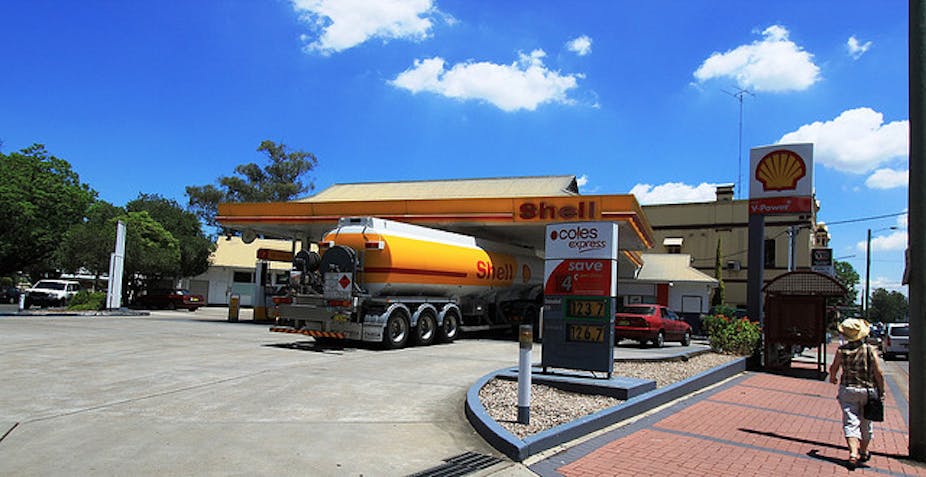Every time smokers pull a cigarette pack out of their pocket, they’re reminded of the harms their habit is likely to cause. In much the same way, Australian petrol stations should display health warnings next to every pump. Not to warn of the immediate dangers of fires, but of the later dangers of pollution.
Petrol stations currently have large-lettered warnings on the dangers of refuelling while smoking or using a mobile phone. But there’s no evidence that mobile phones start petrol station fires. There is, however, a wealth of scientific evidence on the negative health effects of traffic pollution, ranging from an impaired sense of smell to death.
Warning: traffic pollution is toxic
Petrol and diesel exhaust fumes contain multiple toxins, the most harmful of which are carbon monoxide, nitrogen dioxide and particulate matter.
Carbon monoxide enters the blood via the lungs and impairs oxygen supply causing suffocation at high doses. At low doses, it causes fatigue and headaches, and can impair the circulatory system, in which case you’re likely to wind up in hospital.
Nitrogen dioxide inflames the lining of the lungs leading to wheezing and coughing. Both short- and long-term exposure have been associated with hospitalisation and death.
Particulate matter is a broad term incorporating anything from coarse dust particles to microscopic specks of heavy metals. The particles in traffic pollution have been associated with impaired cognitive function and preterm birth.

Cigarette-style warnings
Tobacco smoke and traffic pollution produce similar toxins (carbon monoxide and fine particles), have a similar route of exposure, and cause similar health problems, including increased risk of premature birth and low birth-weight babies.
Cigarette packet warnings have raised the public’s knowledge of the health risks of smoking. In much the same way, petrol station warnings have the potential to increase the public’s awareness of traffic pollution and prompt a positive change in behaviour.
The warnings would be simple statements such as those used on cigarette packets. They could warn of specific health issues: “Warning: traffic pollution triggers heart attacks”, or about vulnerable groups: “Warning: traffic pollution harms unborn babies” or “Warning: keep children away from traffic pollution”.
Only a small change in behaviour is needed to make the warnings worthwhile. Printing and sending eight stickers to each of the 8,000 petrol stations in Australia would cost around A$15,000. Given that health economists value a year of life at around A$40,000, if this initiative prevented even one of the estimated 1,400 deaths due per year to traffic pollution, the warnings would easily be cost-effective.
Cleaner air
Traffic pollution is not seen as a big issue in Australia, partly because it can’t be seen. One commonly used argument to dismiss its effect is to compare pollution levels in our cities with levels in London or Beijing, and declare that, by comparison, we don’t have a problem. But this same flawed argument is often used by “social smokers”: rationalising their own smoking by comparing themselves to 40-a-day smokers.

A warning would act as a persistent reminder to car drivers of their individual contribution to air quality, and of the health effects of what they are about to burn. It may nudge people to drive less, or even to buy a hybrid or electric car.
School pick-ups, where rows of children wait next to idling engines, seem perversely designed to expose a highly vulnerable group to as much traffic pollution as possible. If parents were more aware of the health effects of their idling engines they would be more likely to turn them off, or even switch to an active transport pick-up.
How would it work?
The ideal scenario would be for petrol stations to voluntarily post warning signs. Although this may seem unlikely, petrol companies have a duty to inform their customers of their products’ health effects, and potentially open themselves to legal action by ignoring the issue.
The warnings would hit the profit margins of petrol companies if there was a reduced demand for petrol and diesel. But I expect this would be favoured over pricier options, such as increasing the costs of petrol to cover the health burden of premature births, asthma attacks and hospitalisations. Avoiding these health-care costs is a smarter option.
Public health organisations should pursue this legislation at state and federal levels, but it’s likely to be a slow process. The health effects of leaded petrol were well known in the early 1970s, but it wasn’t until 2002 that leaded petrol was finally phased out in Australia. Let’s hope that this simple reform happens faster.
Should petrol stations display cigarette-style warnings on the health harms of pollution? Share your thoughts below.

